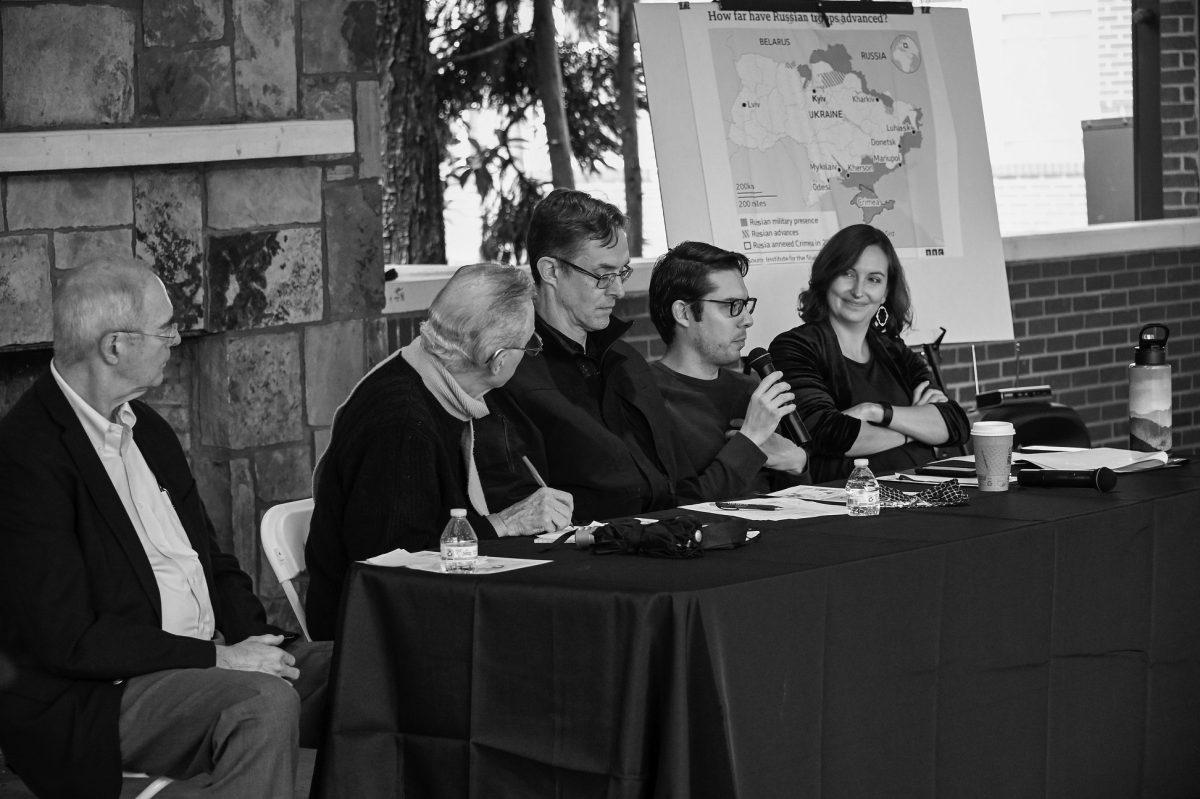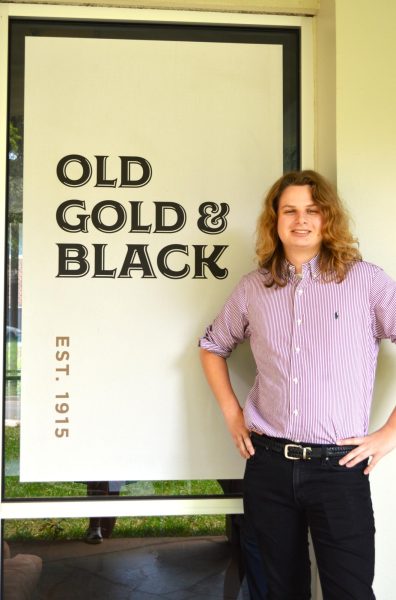The current international crisis of Russia’s invasion of Ukraine has left many people around the world worried about what is happening and what is going to happen in Ukraine, as well as prompting concern around other parts of the globe. In response to these sentiments, the Government/International Affairs and History departments hosted an expert panel on the issue.
The panel was moderated by Vicki Gilbert, Assistant Professor of Government and International Affairs, and included Professor Mike Peterson from St. John’s College, as well as Wofford professors Bill DeMars, Clayton Whisnant and Phil Dorroll. Each panelist spoke on a specific topic of interest and study and afterwards answered questions from the audience.
DeMars, professor and chair of the Government and International Affairs department, was the first panelist to speak, touching on the topics which he sees as surprises and on the debate on when this conflict really started.
Included in the surprises surrounding the invasion, DeMars brought up Russia putting around 70% of its troops around Ukraine before the invasion, Ukraine’s ability to hold back the Russian invasion, the rallying of NATO allies against this invasion despite some reliance on Russian energy and more.
Towards the end of his speech, DeMars brought up how hard it is to pinpoint where the problems that led to this conflict began. While some would identify the origin of the conflict in 2014, when Russia took over Crimea and annexed the area, as well as other areas in Eastern Ukraine, others could counter with Putin’s 2004 comments where he brought up how the United States discussed not expanding NATO back in 1991.
Wofford Professor of History Clayton Whisnant focused on Ukrainian politics in his speech. Whisnant focused on three specific time periods of Ukrainian politics: the end of the USSR to the 2004-2005 Orange Revolution, from that point until the Euromaidan protests in 2014 and, finally, politics post-2014.
Whisnant’s primary focus on Ukraine showed how competing oligarchs and protests against certain oligarchs shape these periods. Unlike Russia, Whisnant pointed out that Ukrainian Oligarchs, while still controlling much of the media in the country at this time, don’t agree on everything.
This leads to some leaders being more pro-Russian and some being pro-Western, with current President Volodymyr Zelenskyy being very anti-oligarch and pro-Western.
Professor Philip Dorroll of Wofford’s Religion department touched on the religious aspects of the invasion. Between the three major branches of Christianity, he explained that both Ukraine and Russia represent Eastern Orthodox Christianity.
Dorroll explained the structure of the Orthodox church as one that does not have a head, like the Catholic church has the pope, nor is completely independent like many protestant churches are. Rather, the Orthodox churches are independent while recognizing each other as the same denomination.
The Orthodox factor plays in here because the Ukrainian and Russian branches have drifted apart on the question of whether the Orthodox church can be part of the West. Ukrainian Orthodoxy has drifted towards democratic and pro-Western, while Russian Orthodoxy has developed an ideology that is monarchist, autocratic, and anti-Western.
Dorroll explained further that Kyiv is seen as a spiritual homeland for Eastern Orthodoxy, so for the Russian Orthodox church, it is unbearable that a branch and country drift in a different political direction as Kyiv has. Beyond that, Dorroll added that the Moscow Patriarch believes the invasion is divinely sanctioned because of Western support for LGBT rights.
Mike Peterson of St. John’s College’s speech focused on speculation for where this conflict could lead. He outlined four different directions the conflict could go in, though each direction is not equally as likely.
The best possible outcome that Peterson outlined was that internal pressures in Russia would make Putin reconsider the invasion, though he detailed that this future was unlikely. The worst, but the highly unlikely direction, would be the war extending beyond Ukraine into NATO territory, which would require NATO action.
One of the more likely directions would be Putin taking Kyiv and then consolidating forces in the eastern and southern sides of Ukraine rather than pushing further forward. The other likely direction is an invasion beyond Kyiv, which would be hard on both Ukrainian and Russian forces.
The latter part of Peterson’s speech detailed thow Europe and the US could help Ukraine in this conflict, including material support, weapons and intelligence.
Peterson also stated that targeted sanctions, especially on the oligarchs surrounding Putin, should be considered. Working with the Chinese government to show how this invasion is against their interests would also help, in Peterson’s opinion.
After these four speeches, the floor was opened for questions from the audience. The first question was whether the sanctions already put on Russia were a mistake or not, which Peterson answered by saying that, while the sanctions may need tampering over time, broad sanctions were a good quick decision against Russia.
The second question asked whether Russians would overthrow their government because of recent events. DeMars’ answered that he was unsure but leaned towards no, since it is hard to know if the Russian people will respond by opposing the Russian government or if their anger will be directed towards America.
The next question asked how China will react, depending on how the West deals with Ukraine. Peterson responded by saying that Xi Jinping most likely had knowledge beforehand but has abstained from explicit support or opposition to Russia. Peterson though believes China would not want to face what Russia has been put through via Western Sanctions.
The next person asked about what country in NATO would break first and about Turkey. Dorroll responded to the latter part of the question stating that Turkey has been fairly supportive towards Ukraine, and the president is concerned with following only what is required of the country in concern to Russia.
Peterson responded to the former part of the question by stating that the United States needs to make sure to maintain Germany’s position against Russia due to its recent reliance on Russian energy.
Another person asked whether it is a good thing for the European Union to consider membership in Ukraine. Whisnant responded by saying that it is good for eastern Europe to be able to choose who they associate with, but things are escalating because Putin is a risk-taker. Whisnant believes that, in Putin’s eyes, time is running out because Ukraine is becoming more and more part of the west.
One of the last questions raised asked why non-white people were not being allowed to cross the border away from Ukraine. Dorroll responded by saying that if many countries see that one is not white or Caucasian, then they are not considered Ukrainian.
In past refugee crises, European countries have sometimes been more concerned with how refugees from non-European nations will affect their culture rather than the humanitarian crisis.
























